We’re excited to share what’s new in the Oracle Integration 25.06 release! This update introduces powerful innovations, starting with the all-new OpenAI Adapter and Native action support for OCI Generative AI, Language, Speech, Vision, and Generative AI Agent (RAG) — enabling smarter, AI-powered solutions.
We’ve also added new adapters like Microsoft SharePoint and Infovity OANDA Exchange Rates Adapter, and delivered key enhancements to popular adapters such as NetSuite, GCP Pub/Sub, and FTP, helping you streamline integration development and improve enterprise connectivity.
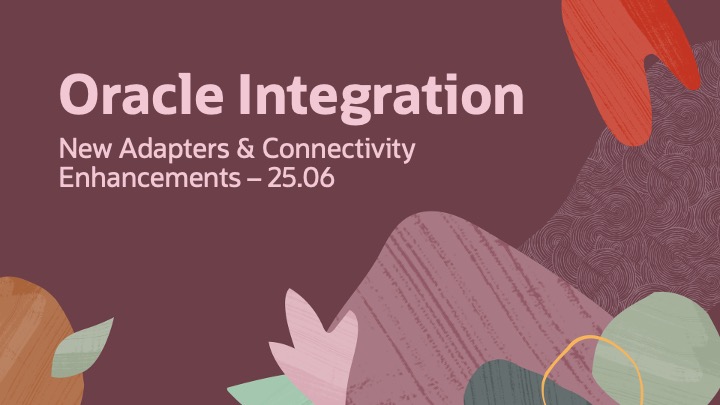
New Adapters
- OpenAI Adapter: Integrate directly with OpenAI’s LLMs for advanced content generation, intelligent summarization, contextual classification, and conversation handling.
- Microsoft SharePoint Adapter: Seamlessly connect Oracle Integration with SharePoint for document and list-based collaboration. Supports both trigger and invoke roles with secure access, rich metadata handling, and CRUD operations.
- Infovity’s OANDA Exchange Rates Adapter: Easily integrate real-time, historical, and forward-looking forex data from OANDA into Oracle Fusion, ERP, and financial systems—perfect for automating exchange rate sync, currency revaluation, and multi-currency planning.
Native Actions for OCI AI services
Oracle Integration now offers native, no-code access to the following OCI AI services:
- OCI Generative AI: Enables integration developers to build prompt-based LLM interaction with multi-turn context, and role definition for natural language-driven automation solutions
- OCI Generative AI (RAG): Retrieve knowledge from documents and combine with LLMs for context-aware, source-cited responses.
- OCI Language & OCI Speech: Add capabilities such as language detection, transcription, sentiment analysis, entity recognition, and translation to your automation solutions.
- OCI Vision: Use pretrained AI models for object detection, face recognition, and image-to-text extraction—no model training needed.
- OCI Document Understanding: Supports streaming-based document processing from OCI buckets for high-volume extraction and analysis.
Adapter Enhancements
- GCP Pub/Sub Adapter enables seamless processing of bulk AVRO messages by supporting publishing and pulling in a single request.
- FTP Adapter supports non-schema-based polling and descending file listing for more flexible file processing.
- Netsuite Adapter enables identity propagation using custom JWT claims for secure, user-specific access.
- Kafka adapter now supports integrating Amazon MSK
OpenAI Adapter – LLM Connectivity Support
Oracle Integration now supports native connectivity to OpenAI’s Large Language Models (LLMs) , enabling powerful AI-driven text processing, content generation, and analysis capabilities —directly within your automation solutions.
OpenAI Adapter Capabilities:
- Prompt-Based Interaction: Provide instructions, questions, or plain text to generate contextual and coherent AI responses.
- Role & Context Definition: Configure roles like user, assistant, or system to influence how the model responds and behaves.
- Context Maintenance: Use previous_response_id to support ongoing conversations and follow-up questions.
- Model Selection & Tuning: Choose from available OpenAI models and fine-tune responses with parameters like temperature.
- Flexible Input Options: Supports simple prompts or structured arrays containing role/content pairs.
- Function Calling Support: Enable dynamic tasks like translation, summarization, categorization, and text generation.
Use Cases:
- Text Analysis: Understand and extract insights from textual data (e.g., analyze employee sentiment from appraisal or customer feedback from product reviews).
- Text Categorization: Automatically classify documents or resumes based on content and predefined rules.
- Email Drafting: Generate intelligent email responses for customer queries, HR communication, or marketing campaigns.
- Translation: Translate customer support responses or documentation into multiple languages.
- Summarization: Condense long documents or reports into digestible summaries for decision-makers.
Introducing Native Generative AI Actions in Oracle Integration
Oracle Integration now offers native support for cutting-edge Generative AI services, enabling intelligent automation with zero custom code. With new actions for OCI Language, Speech, Vision, and Generative AI Agents (RAG), users can now build smarter, context-aware automation solutions that see, hear, understand, and respond in real time.
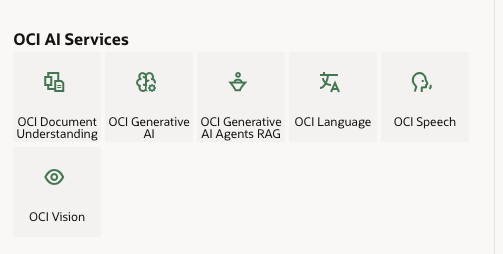
OCI Generative AI – Native Action Support
With this release, Oracle Integration adds native action support for OCI Generative AI, allowing users to connect with large language models (LLMs) like Llama and Cohere directly within automation solutions.
Key Capabilities:
- Prompt-Based Interaction: Send free-form text prompts to LLMs and receive relevant AI-generated responses.
- Context Maintenance: Maintain multi-turn conversation context across follow-up prompts.
- Role and Content Definition: Define roles such as Developer, Assistant, or User, and provide contextual input to guide AI responses.
- Text Communication: Engage in natural, chat-like interactions through simple text input.
Use Cases:
- Text Analysis: Automatically analyze feedback, such as categorizing healthcare sentiment as positive, neutral, or negative.
- Text Categorization: Screen and categorize resumes based on job fit, skills, and experience.
- Email Drafting: Generate email drafts from structured input like recipient, subject, and message—ideal for automated customer communication.
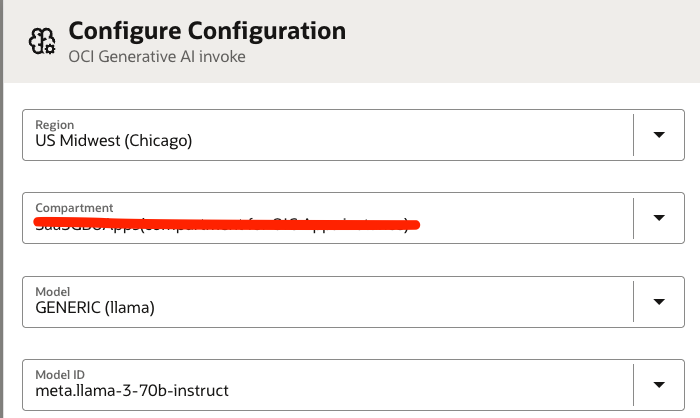
OCI Generative AI Agent (RAG) – Native Action Support
A new native action is now available in Oracle Integration to support Retrieval-Augmented Generation (RAG) capabilities using the OCI Generative AI Agent service. This action enhances GenAI interactions by retrieving relevant content from a connected knowledge base and generating context-rich, source-cited responses.
With this release, the OCI GenAI agent (RAG) native action enables:
- Listing of agent endpoints to route prompts through the appropriate model.
- Session management for maintaining conversational context across multi-turn interactions.
- Natural, text-based AI communication, combining retrieved data from documents with generative responses.
Example Use Cases
- Expense Report Evaluation: Automatically approve or reject submitted expense items based on internal policy documents stored in a connected knowledge base.
- Real-Time Legal Analysis: Instantly retrieve and analyze clauses from legal documents to assist lawyers during case preparation.
- Product Recommendations: Enhance customer experience by delivering personalized recommendations powered by up-to-date product documentation or catalogs.
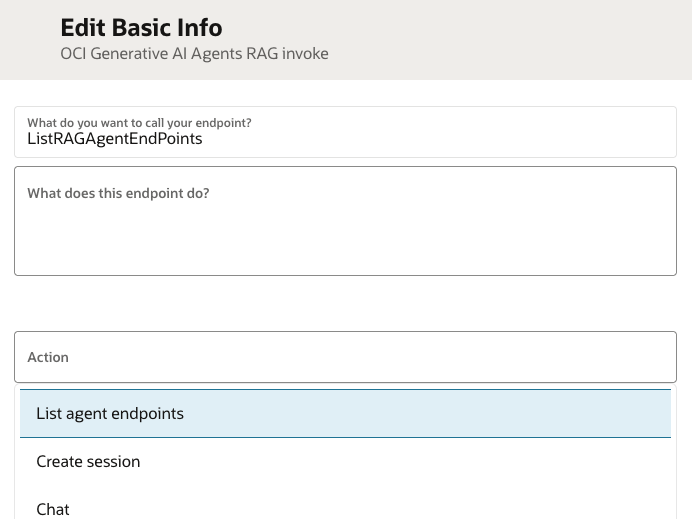
OCI Language and Speech – Native Action Support
With this release, Oracle Integration introduces native action support for OCI Language and OCI Speech services, enabling developers to add powerful text and speech intelligence capabilities directly into integration flows without writing custom code.
OCI Language Capabilities:
OCI Language provides a rich set of out-of-the-box capabilities powered by pretrained models. These models are ready to use and do not require custom training or tuning.
Functional Capabilities
- Language Detection: Identify the language of a given text with confidence scores.
- Text Classification: Categorize content into document-level categories and subcategories.
- Entity Recognition: Extract common entities like names, locations, emails, and more.
- Key Phrase Extraction: Identify the most relevant phrases in a block of text.
- Sentiment Analysis: Detect sentiment (positive, negative, or neutral) in textual content.
- Text Translation: Translate text between supported languages.
- PII Detection and Redaction: Automatically detect and redact personally identifiable information (PII).
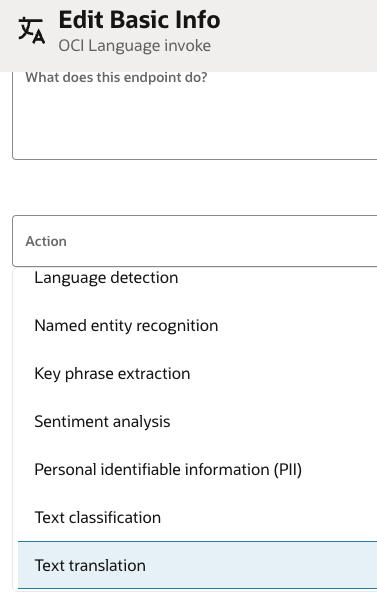
OCI Speech Capabilities:
OCI Speech also uses pretrained AI models to transcribe and analyze audio content. These capabilities are available out of the box, with no training or model configuration needed.
Functional Capabilities
- Speech-to-Text Transcription: Convert spoken audio into text across supported languages.
- Language Detection: Identify the language used in audio files.
- Speaker Diarization: Distinguish between different speakers in a recording.
- Custom Vocabulary: Improve transcription accuracy with domain-specific terminology.
- Punctuation and Formatting: Generate well-formatted transcripts.
- Live and Recorded Audio Support: Handle both real-time and batch audio files.
- Timestamps and Confidence Scores: Output includes time markers and confidence levels.
- Profanity Filtering: Automatically masks offensive words.
Use Cases:
- Automated Call Center Quality Monitoring: Convert recorded customer calls to text using OCI Speech, analyze sentiment using OCI Language, and flag high-risk conversations for escalation or CRM follow-up.
- Meeting Transcription & Action Item Extraction: Transcribe meetings from collaboration platforms like Zoom or Microsoft Teams and use OCI Language to extract actionable items, which can be routed to tools like Jira or Asana.
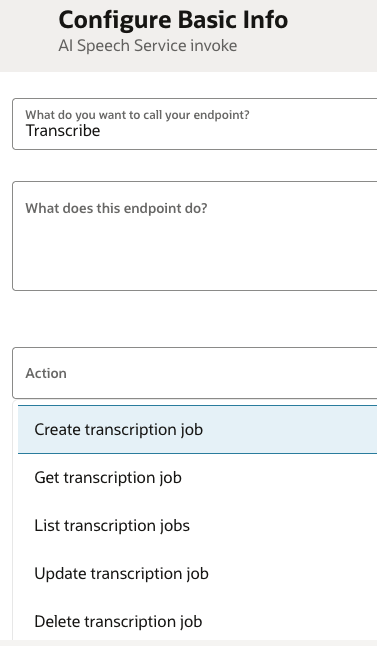
OCI Vision – Native Action Support
With this release, Oracle Integration adds native action support for OCI Vision, enabling users to incorporate image analysis directly into their integration flows using pretrained AI models. This allows for powerful no-code use cases such as automated document validation, object detection, and face recognition—without the need to build or train custom models.
OCI Vision Capabilities:
- Object Detection: Identify and locate specific objects in an image (e.g., car, person) with bounding boxes and confidence scores.
- Image Classification: Predict the category of an image with labels and associated confidence levels.
- Face Detection: Detect faces in an image, including bounding boxes and optional metadata such as age and gender.
- Text Recognition: Extract words and lines from images, returning text with bounding polygons and confidence scores.
Note: Single image requests are supported in this release; batch processing will be available in future updates.
Use Cases:
- Automated Defect Detection in Production Lines: Capture product images and use OCI Vision to identify defects, triggering corrective workflows in ERP, SCM, or ServiceNow.
- Visa Photo Validation: Validate visa application images (e.g., face presence, background compliance), and flag issues for manual review or resubmission.
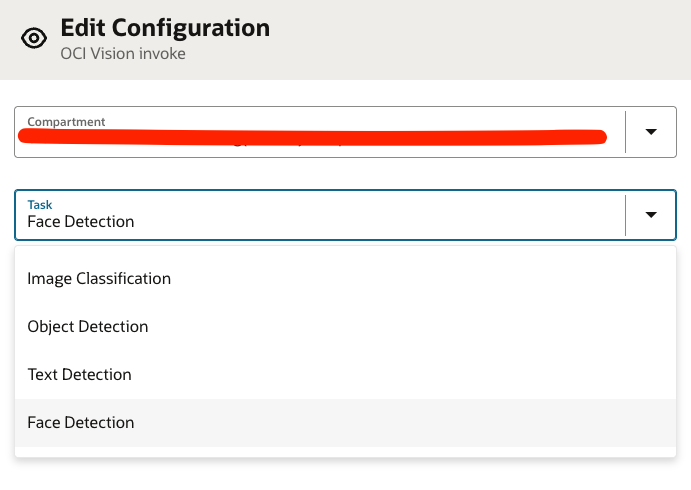
Enhanced Document Understanding Support with Native Actions
Oracle Integration now enhances its native action support for Document Understanding, expanding capabilities beyond just OCI Object Storage (buckets) to support a range of document AI services. This enhancement allows for scalable and efficient processing of large volumes of data using streaming, enabling seamless document extraction and analysis.
In addition to OCI buckets, native actions are now available for:
- Document Classification
- Analyze Document
- Create a Processor Job
- Get Processor Job Status
- Cancel a Processor Job
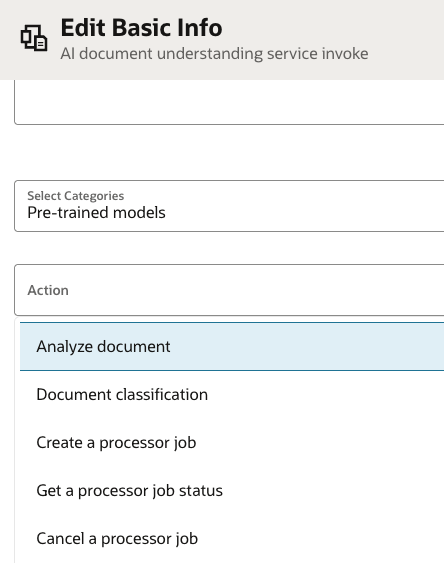
Microsoft SharePoint – New Adapter
We’re excited to introduce the Microsoft SharePoint Adapter—designed to simplify integration between Oracle Integration and SharePoint Online, a powerful collaborative platform for document sharing and list-based data management across teams.
The SharePoint Adapter supports both invoke (outbound) and trigger (inbound) roles, offering robust capabilities for working with SharePoint content and metadata.
Invoke (Outbound)
- Supports interaction with two key SharePoint elements: Documents and Lists.
- Performs file operations such as upload, download, and delete.
- Enables CRUD operations on list items: Create item, Get item, Update item, Delete item, and List items.
- Facilitates listing of sites, lists, drives, and items.
- Supports OAuth 2.0 Client Credentials for secure outbound requests.
- Supports Connectivity Agent for accessing SharePoint resources located behind a firewall or within private networks.
Trigger (Inbound)
- Supports triggers flows based on list, items, and file changes (Create, Update, Delete) using subscription-based notifications.
- Supports OAuth 2.0 Client Credentials and Digital Signature policy for secure inbound processing.
You can implement the SharePoint Adapter in use cases such as:
- Send a Slack message when a site is created or updated in SharePoint
- Upload Files from Box to SharePoint
Connectivity and Setup
To connect with the SharePoint Adapter, provide the Tenant ID (under Properties), and configure the required security fields:
- For Invoke, specify the Client ID and Client Secret
- For Trigger, specify the Client ID, Client Secret, and Client State
Ensure necessary API permissions are granted via Azure Active Directory, including access to SharePoint and Microsoft Graph APIs.
Use the Connectivity Agent if the SharePoint endpoint is hosted in a restricted network environment (For Invoke only).
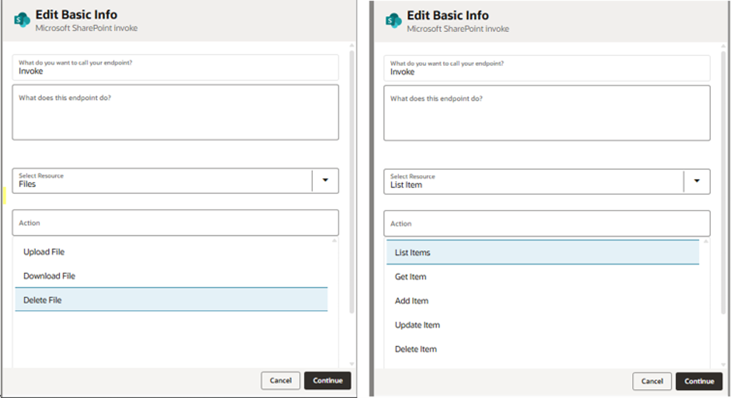
Integrate Real-Time Forex Data Seamlessly with Infovity OANDA Exchange Rates Adapter
The Infovity OANDA Exchange Rates Adapter offers a seamless way to integrate foreign exchange rate data into your enterprise systems, including Oracle Fusion, ERP platforms, trading tools, and financial applications.
Designed to work with the OANDA Exchange Rates API, this adapter allows you to access live, historical, and forward-looking forex rates in a simple, easy-to-integrate JSON format. Whether you’re looking for real-time rates, historical analysis, or currency conversion capabilities, this adapter has you covered.
Key Features & Capabilities
The Infovity OANDA Exchange Rates Adapter provides a comprehensive suite of currency data capabilities, including:
- GetSpotRates
Retrieve current exchange rates or rates at a specific historical point in time. Updated as frequently as every 5 seconds for near real-time data. - GetCandleRates
Obtain one daily candle (open, high, low, close) per specified currency pair, perfect for daily financial summaries. - GetCandlesRates
Access all daily candle data over a defined date range, enabling historical trend analysis. - GetAggregatedRates
Generate a single aggregated candle over a specified time range per currency pair—ideal for summarizing exchange rate movement. - GetForwardRates
Retrieve forward curves for selected currency pairs across multiple tenors for future rate planning and hedging. - GetRemainingQuotes
Monitor your usage and remaining quote limits during the current billing period. - GetCurrencies
Fetch a complete list of valid three-character currency codes supported by OANDA’s API. - GetSupportedForwards
Access all valid currency pair and tenor combinations supported for forward rate calculations.
Use Cases in the Context of Oracle Fusion
The Infovity OANDA Exchange Rates Adapter is particularly powerful when integrated with Oracle Fusion Applications, helping automate and enhance several critical finance and operations processes. Below are some real-time use cases tailored for Oracle Fusion ERP, Financials, and Planning environments:
- Automated Exchange Rate Synchronization
Automatically fetch and update OANDA exchange rates into Oracle Fusion GL and Payables. - Multi-Currency Transactions & Conversions
Convert foreign currency transactions in real time using the latest OANDA rates. - Accurate Currency Revaluation & Translation
Revalue and translate foreign currency balances using auditable OANDA FX rates. - Enhanced Financial Forecasting in Oracle EPM
Use forward-looking OANDA rates for accurate multi-currency planning and forecasting. - Integration with Oracle Integration Cloud (OIC)
Seamlessly connect OANDA with Oracle Fusion via drag-and-drop integrations in OIC. - Compliance and Audit Support
Ensure audit-ready, compliant FX rate histories using consistent OANDA data.
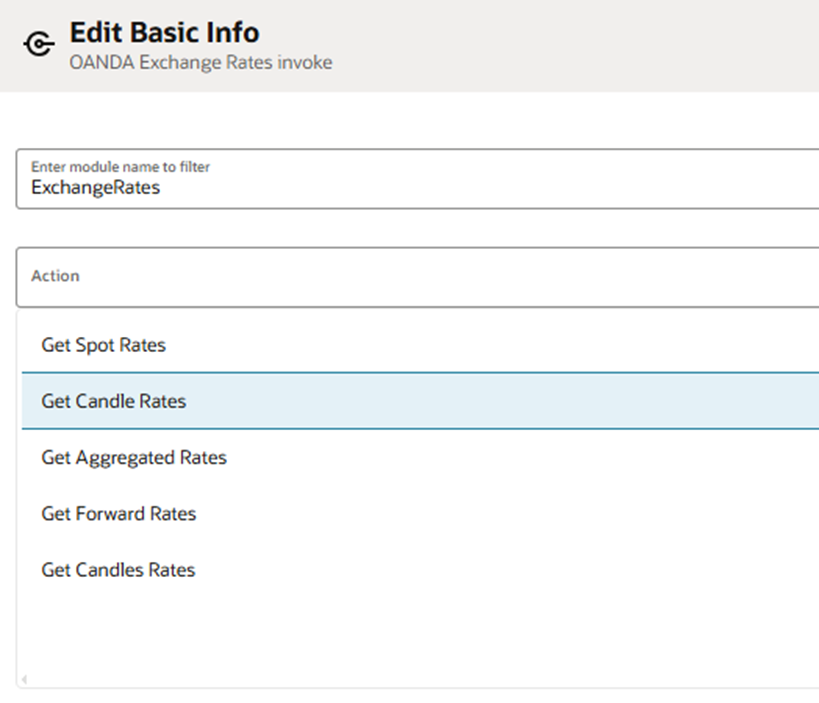
GCP Pub Sub Adapter enhancement – Support to pull/publish multiple messages while using AVRO (binary) topics
GCP Pub Sub adapter has enhanced its pull and publish features for the AVRO Topics with Binary message encoding.
Currently, the adapter was able to publish only a single message at a time. Now, it supports publishing up to 1,000 messages (10 MB) in a single request.
Similarly, the adapter has also addressed its limitation of pulling only one message per request when using AVRO Topics with Binary message encoding. Now users can pull up to 100 messages per request
These improvements significantly enhance the adapter’s scalability and performance, offering greater efficiency to users in this release.
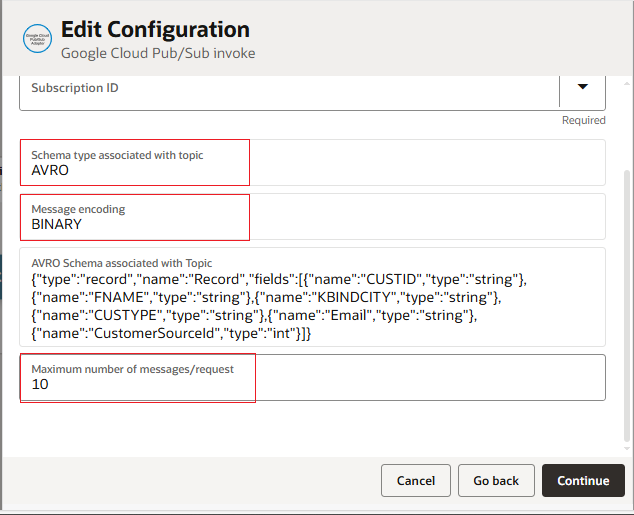
FTP Adapter Enhancements – Support Non-Schema-Based Polling and Descending File Listing
The latest release introduces powerful enhancements to the adapter, starting with support for non-schema-based polling. Previously, a file schema (CSV, XML, XSD, or JSON) was mandatory for polling files. Now, the adapter can poll any file up to 1GB, regardless of format. While providing a schema is still an option, it is no longer required—enabling broader compatibility with diverse file types.
Another key enhancement is the ability to list files in descending order from the input directory. To enable this, simply check the “Use Descending Order” option during the List Files operation.
Together, these features greatly enhance the adapter’s flexibility and usability, making it easier to handle a wider range of file integration scenarios.
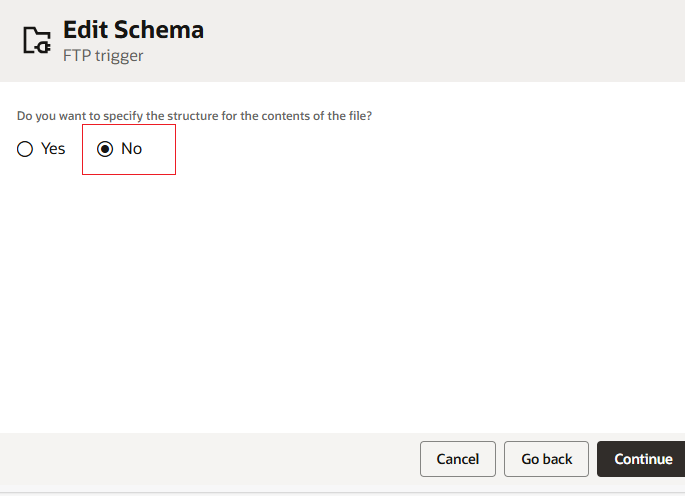
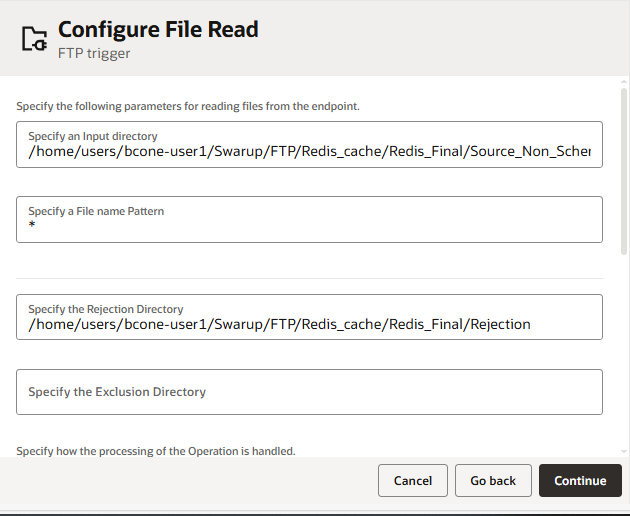
Netsuite Adapter Enhancement – Support Identity propagation
We’re introducing Identity Propagation support in the NetSuite Adapter using custom JWT claims. This enhancement allows Oracle Integration Cloud (OIC) flows to dynamically pass user-specific credentials (token ID and token secret) to NetSuite securely at runtime.
How to Implement It
In the REST trigger, enable “Configure Custom JWT Claims” and define claims such as tokenID and tokenSecret. These are then mapped in the NetSuite endpoint using the new securityProperties section in the mapper—no change is required in the adapter configuration itself
What Use Case Are We Solving?
This allows OIC integrations to perform user-level operations in NetSuite, replacing static credentials with dynamic, per-user authentication. It improves security, accountability, and enables role-based actions across business workflows.
Use Case: HR Portal with User-Specific NetSuite Access
Consider an HR portal where users trigger tasks like accessing payroll or updating employee data. With identity propagation enabled, their individual tokens (tokenID and tokenSecret) flow through OIC, ensuring that all NetSuite operations reflect the correct user identity, enhancing security and auditability.
Apache Kafka Adapter Now Integrates with Amazon MSK
We’re excited to announce the latest updates to the Apache Kafka Adapter in Oracle Integration! With these new features, you can now connect to Amazon MSK using connectivity agent, enabling seamless integration and expanded possibilities for your enterprise.
